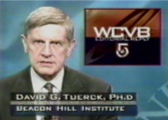Response to WCVB-TV editorial of June 8, 1998
By David G. Tuerck,
PhD
Executive Director, Beacon Hill Institute
Chairman and Professor of Economics
Suffolk University, Boston, Massachusetts
A recent WCVB-TV editorial supported the MassJobs
Council's controversial recommendation allowing welfare recipients
to count education or job training toward their work requirement
– instead of getting their training “on the job”
as the law requires.
Governor Cellucci felt this idea
was such a bad deal for taxpayers that he fired the entire Council.
Instead of arguing about how government
should run the welfare system, it's time to look at a better way
to dispense benefits. Massachusetts should eliminate the government
middleman and let private charities step in to assist those who
need help.

Currently, 28 states offer tax credits
to individuals who give to charitable organizations that help the
poor. A tax credit permits you and me to reduce our tax bills dollar-for-dollar
for what we give, up to some limit.
Charitable tax credits take dollars
that would otherwise go through a government bureaucracy and directs
them to private charities that are already helping the needy.
Unfortunately, Massachusetts does
not encourage taxpayers to give to charities.
At the Beacon Hill Institute at
Suffolk University, we believe that Massachusetts should end the
fighting over work versus education and adopt what is working in
28 states. Allowing tax credits for giving money directly to those
charities that are helping the poor makes sense for everyone.
David G. Tuerck
is the executive director of the Beacon Hill Institute at Suffolk
University. This response aired on WCVB-TV, Channel 5, Boston on
Wednesday, June 24, 1998.
Format revised on 18
August, 2004
|